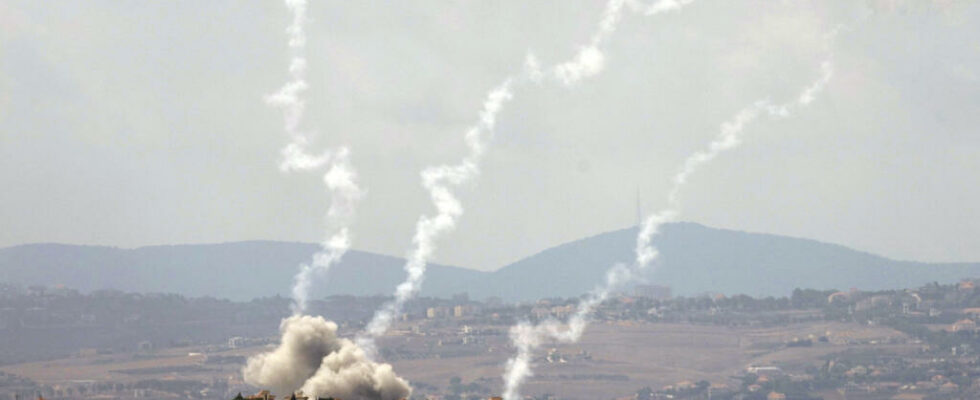Israeli strikes in Lebanon hit the UN General Assembly hard. The threat of a new war largely occupies the major diplomatic meeting in New York. The intense Israeli strikes against Hezbollah left hundreds dead on Monday, September 23, in Lebanon, including 24 children. Arab countries are calling for an urgent response from the international community.
4 mins
The UN was already powerless to silence the guns in Gaza, Israeli offensive in southern Lebanon in the middle of the General Assembly, is an additional blow, reports our special correspondent in New York, Julien Chavanne.
UN chief Antonio Guterres is sounding the alarm. The Secretary-General is very seriously concerned about the escalation of the situation along the border. He is very concerned about the high number of civilian casualties. There is no military solution that today would make a country safer. “, said his spokesperson Stéphane Dujarric.
Call for ” intervene immediately »
After calling for a Security Council on Gaza this Friday, Lebanon’s allies are taking it up a notch. Egypt is calling on international powers to “ intervene immediately “Iraq wants a ” urgent meeting “Arab countries on the sidelines of the UN General Assembly for ” stop Israel ” and Jordan warns of the risk of a “ global regional war ” Initiatives without effect on the Israeli Prime Minister. Benjamin Netanyahu could cancel his visit to the UN anyway.
Also readMiddle East conflagration at the heart of the 79th session of the United Nations General Assembly
An out-of-control situation and an extension of the conflict between Israel and the Iranian-backed militias is in any case exactly what the United States wanted to avoid. Since the explosion of the Hezbollah pagers, the American authorities have called on everyone to exercise restraint and say they are in constant contact with their counterparts, particularly Israeli ones. At the time of receiving the leader of the United Arab Emirates at the White House this Monday and before leaving for its last United Nations General AssemblyPresident Joe Biden kept saying.
Biden is working on “ a de-escalation »
” I have been kept up to date on the latest developments between Israel and Lebanon. My team members are in constant contact with their counterparts and we are working to de-escalate in a way that allows people to return home safely. ” he assured.
On the military front, the Pentagon announced that the American presence in the region will be reinforced. Given the growing tension in the Middle East and as a precautionary measure, we are sending a small number of additional U.S. military personnel to reinforce our forces already present in the region. “, explains the defense spokesman. These soldiers, who number in the dozens, will have the task of helping to secure the troops already present on the ground. There are approximately 40,000 American soldiers present in different countries in the Middle East.
For his part, Josep Borell, the head of European diplomacy, considered that the escalation between Israel and the Lebanese Hezbollah was ” extremely worrying and dangerous. Civilians are paying a high price. All-out war must be avoided, and to do that, new mediation efforts are needed. Now is the time to do that, here in New York. Everyone must work to ensure that we do not continue down the path to war. »
Hezbollah allies condemn ” a barbaric aggression »
Hezbollah’s allies, for their part, unanimously condemned the largest Israeli offensive on Lebanese soil since the war between the two camps in 2006, ” a large-scale barbaric aggression “, which Hamas calls a war crime. The Palestinian Islamist movement has unsurprisingly affirmed its support for its ally. Hezbollah launched rockets towards northern Israel in the aftermath of October 7 and the Shiite militia has vowed to continue its fire on Israeli territory until the end of “ of the aggression in Gaza “.
Iran, the main supporter of Lebanese Hezbollah, has accused, through the voice of its presidentthe Hebrew state of wanting to “ widen the conflict ” in the Middle East. With the intensification of bombings on southern and eastern Lebanon, the risk of a regional conflagration is at the heart of Tehran’s discourse. The spokesman for the Iranian Foreign Ministry warned against “ dangerous consequences » Israeli attacks.
In Iraq, Grand Ayatollah Ali Sistani, the highest religious authority for Iraq’s millions of Shiites, called for every effort to be made to stop, “ barbaric aggression “, but also to protect the Lebanese people.
International guestMilitary escalation in the Middle East: “Today, the United Nations does not have the means to prevent a war”
